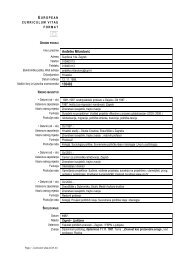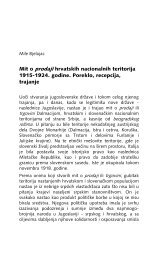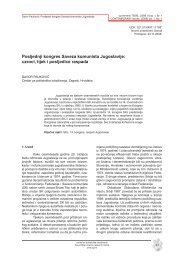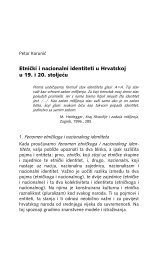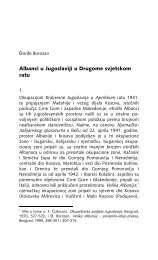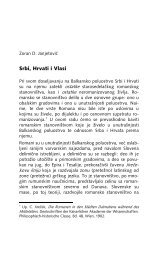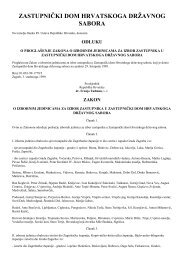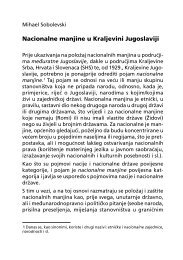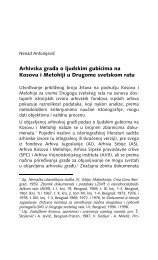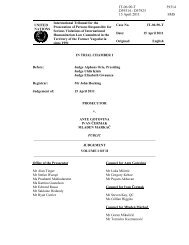Plamena Pehlivanova: The Decline of Trust in Post-Communist Societiessuvremene TEME, (<strong><strong>2009</strong>.</strong>) God. 2, Br. 1CONTEMPORARY issues, (<strong>2009</strong>) Vol. 2, No. 14. AgeIn order to dig deeper into the causalityof the decline in trust and participation of theBulgarian, Russian and Chinese society, wemust look at the age distribution in these countries(Table 2). It is striking to see that 23.3% ofthe Bulgarian society consists of people over 65years old, while in the Chinese they compriseonly 6% of the population. There is a big differencein Bulgarian and Chinese demographics,where the Bulgarian population growth rateis -0.813% (2008 est.), the Chinese is 0.629%(2008 Est.). How does this affect the reports ontrust and participation of the two populations?The older generation in Bulgaria reportsto participate least in voluntary organisations andexpresses the highest dissatisfaction with life.For example, to the question in the World ValueSurvey: “Please look carefully at the followinglist of voluntary organisations and activities andsay...which, if any, you belong to?” 79% of theBulgarians answered “Belong to none”. Herewe see that only 20% of Bulgarians and 32% ofRussians belong to any voluntary organisations,in contrast to 92% of Dutch. In order to explainthis phenomenon of decline in associational lifewe must look at two factors: age and income ofthe population. As previously noted, 43% of theinterviewed Bulgarians is above 50 years of age;while in China it is only 25%. In other words, thedominant population of Bulgaria consists of elderly(born after 1951) while China consists ofpredominantly 33-49 year olds. Therefore, theanalysis has to control for the variable of age andincome to see whether their effect on participation.When controlling for age, the World ValueSurvey presents that 46% (BG) of the “Belongto None” section is made up of people above 50years old (Table 3). Interestingly enough, theChinese model shows that 43% of the “Belong toNone” section is composed of 15-29 year olds.Therefore, the Bulgarian and Chinese modelseems to differ in the level of participation betweentheir age groups. What does this tell usabout the younger generation in China and theolder generation in Bulgaria? Since the Bulgarianpopulation is dominated by the older generation,we see that this survey on participation isalso influenced by the opinions of the elderly.The outcomes also support observationsmade by Terry Clark in his The New PoliticalCulture that younger people participatemore than the elderly (Clark, Hoffmann-Martinot,1998:126). In support of the New Political Model,we see that in Bulgaria there is a decline in associationallife with the increase of the age factor.Similarly, the table below shows a decrease incultural activism with the increase of age.5. Social and Cultural ParticipationJames Coleman and Robert Putnamboth emphasize trust as an important factor forthe establishment of civil society, the sense ofcommunity and connection between citizens ininstitutions that connect them with government.Political activism is an example where the socialtrust is measured in participation. In BowlingAlone, Robert Putnam chooses bowling asTable 2:Participation declines with AgeAge vs. Mean of Belonging to Cultural Organisations15-24 0,17525-34 0,12335-44 0,1145-64 0,165 0,085Survey conducted by Terry Clark, University of Chicago* This table controls for the Age vs. Mean of people belonging to CulturalActivitiescentar za politološka istraživanjathe political science research centrewww.cpi.hr36
Plamena Pehlivanova: The Decline of Trust in Post-Communist Societiessuvremene TEME, (<strong><strong>2009</strong>.</strong>) God. 2, Br. 1CONTEMPORARY issues, (<strong>2009</strong>) Vol. 2, No. 1an example of civic participation, which providesfor bonding and establishment of social trust. Hefurther argues that social trust is strongly associatedwith forms of civic engagement and socialcapital. Putnam implies that “people, who trusttheir fellow citizens, volunteer more often, participatemore often in politics and communityorganisations.” (Putnam, 2000: 136-137). It isdiscouraging to see the statistic on Bulgaria andRussia, which show a decline in participationand relevantly the decline in trust. In her articleSocialization for Participation, Natalia Letki discussesthat the low level of citizen involvementin politics, in East-Central Europe, is linked tolow levels of social capital. Letki mentions theprevailing apathy, lack of interest and low participationin politics. (Letki, 2004: 669). Accordingly,the author cites leading sociologists suchas Inglehart and Catterberg, who argue that theweakness of political involvement are blamed onthe weakness of civil society and low levels ofinterpersonal trust.The World Value Survey and the NewDemocracies Barometer present very little positivetrust in civil and political institutions (for Bulgaria)with most distrust directed toward the JudiciarySystem and the Parliament. Participationin political parties, trade unions and other governmentorganisations is witnessing a decline.From Putnam’s point of view, Bulgaria and Russiaare witnessing a great decline in participationin relation to trust. However, one might arguethat this evaluation is based only on the analysisof formal civic and political organisations.As argued by Clark, Achterberg andNavarro, Putnam doesn’t take an account forscenes 3 and thus excludes the unofficial types ofsocial participation, which also generate social3 Scenes are the concept introduced in Clark, Achterberg,and Navarro conference paper Culture is on the Rise - Why?Theories of Cultural Participation and Empirical Evidence.Scenes are constructed by physical structures, people andneighborhoods. People’s interaction with these structurescreates the dynamic of scenes. The three aspects of scenes(values on which they are judged) are: legitimacy, authenticityand theatricality.Table 3Rising Membership of Cultural Activity GroupsCountry 1981 1990 2000 DeltaNetherlands 12,5 34,6 45,2 32,7USA 13,9 19,7 36,9 23Bulgaria 4,3 4 -0,3Portugal 6,2 3,7 -2,5Brazil 5,4 2,4 -3Latvia 6,8 3,7 -3,1Russia 4,9 1,2 -3,7Lithuania 7,3 2,9 -4,4China 7,3 2,2 -5,1* Survey conducted by Terry Clark, University of Chicagocentar za politološka istraživanjathe political science research centrewww.cpi.hr37






